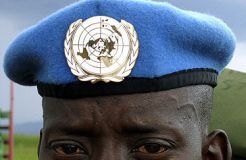AU, UN work hard to have troops for Darfur force
ADDIS ABABA, Nov 21, 2007 (AFP) – African Union and United Nations officials say they are struggling to get the troops needed for a joint force in Darfur, which is due to replace an ill-equipped AU deployment within weeks.

They had sent out teams to different countries to try to get them to supply soldiers for the revamped force, he said.
“A special mission is ongoing in Ethiopia and Egypt, countries which, thanks to their geographical proximity, could speed up the deployment of their forces to Darfur,” he added.
The UN voted to launch the joint AU-UN force, UNAMID, last July and it is due to deploy in Darfur by December 31 at the latest.
The force of 26,000 mainly African troops was expected to replace the under-funded, ill-equipped and out-manned 7,000 African Union force, which has served in the region since 2004.
But Jean-Marie Guehenno, the UN’s Under Secretary-General for Peacekeeping Operations, warned last week that equipment issues risked undermining the credibility of the joint force from the outset.
It lacked crucial elements including a ground transport unit, 18 transport helicopters and six helicopters for light tactical purposes, he said.
“For the early phase of 2008, we need to have a force that is able to meet the test because we believe that that mission will be tested in early 2008,” said Guehenno.
If the force “is not able to meet that test in a credible manner, then it will be very bad for our efforts in Darfur,” he said, adding: “The clock is ticking. ”
South Africa’s deputy foreign minister Aziz Pahad backed Guehenno on Tuesday, saying: “We agree with him fully when he says it tells a sad story of commitment to Darfur.
“We cannot keep talking of the crisis in Darfur and keep talking of the violence that is increasing without ensuring that those that have the capacity do provide the capacity so the hybrid force can be in place as scheduled.”
South Africa was considering a UN request to contribute helicopters and ground transportation, he said, and has already agreed to boost its existing presence in the region from 700 to 800 by December.
But Pahad added: “The key challenge is that developed countries must move decisively to provide the equipment that is needed. That includes Russia, China, the United States and some of the EU countries.”
The existing AU force has had to contend with a string of lethal attacks, the worst of which came on September 29 at their camp at Haskanita, southern Darfur, and left 10 peacekeepers dead: seven from Nigeria and one each from Botswana, Mali and Senegal.
“It’s true that since the attack at Haskanita, the troop-contributing countries have asked legitimate questions, including China who are deploying engineering units,” one AU official conceded.
AU security chief Djinnit however remained confident, noting that Nigeria, despite its losses, was sending a 700-strong batallion. A batallion from Rwanda had also arrived in the region at the end of October.
And on Tuesday, Tanzania announced it was sending 800 soldiers in March.
There was no contingency plan in the event of the UN force deploying late, Djinnit said, adding: “The handover will happen automatically on January 1.”
Apart from the existing UA force, only the command structure of the UNAMID force and a small Chinese team of military engineers are on site.
But Sudan, which long resisted the idea of a UN force, still wants it to remain essentially African.
The UN says Khartoum has refused to approve the arrival of a batallion of Thai troops, two reserve companies of Nepalese troops, including one special forces unit, and a company of engineers provided by the Nordic countries.
The force is tasked with ending more than four years of bloodshed in which more than 200,000 people have died from the combined effects of war, famine and disease while 2.2 million others have been left homeless, the UN says.
(AFP)
